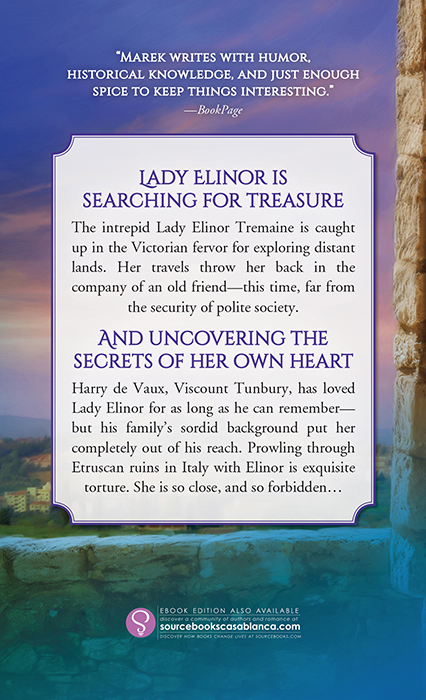Lady Elinor's Wicked Adventures (29 page)
Read Lady Elinor's Wicked Adventures Online
Authors: Lillian Marek

“You needn't worry,” Emily assured him. “We are all excellent riders, and I am told that the cold is preferable to the heat of the summer.”
M. Chambertin smiled at her and shook his head. “I do not doubt that you are a horsewoman
par excellence
, and your mother and Lady Julia as well. However, the journey over the mountains will take weeks. We will encounter few villages, and those are of the most poor. There will be times when we must sleep in tents or take shelter in stables. Nowhere will there be comfortable inns where ladies can refresh themselves.”
Emily and Julia looked at each other, sharing their irritation. Male condescension was obviously to be found everywhere.
“I believe you misunderstand the situation, gentlemen.” Julia spoke in her iciest, most superior tones. “We are not fragile pieces of porcelain. We are grown women, and English women at that. I do not think you will find us swooning at the sight of a spider. Or, for that matter, at the sight of a lion. Since Lord Penworth has determined that we are capable of undertaking the journey, I see no need for you to question his judgment.”
Thank you for reading
!
At Sourcebooks we are always working on something new and exciting, and we don't want you to miss out.
So sign up now to receive exclusive offers, bonus content, and always be the first to get the scoop on what's new!
The book to which Lord and Lady Penworth frequently refer is
The
Cities
and
Cemeteries
of
Etruria
by George Dennis, a two-volume work of more than a thousand pages, first published in 1848. It is still regarded as an important reference on Etruria. Unfortunately for Mr. Dennis, he never received the honors he deserved during his lifetime because of his lack of academic credentials. His book was, of course, appreciated by perceptive readers like Lord and Lady Penworth.
Around the time of our story, Prince Torlonia retained the Florentine archaeologist Alessandro Francois to conduct explorations of the Etruscan necropolis of Vulci on his estate. In 1857, the archaeologist discovered what is now known as the Francois Tomb, with its magnificent frescoes. I transported it to Prince Savelli's estate so that my characters would not have quite so far to travel from Rome and pushed its discovery up by a year. Carlo Ruspi was an artist noted for his drawings of works discovered by archaeologists, and he did indeed do the drawings of the Francois Tomb murals. The murals themselves were detached from the tomb shortly afterward and are now in the Villa Albani in Rome. Prince Savelli was right: The paintings do shed light on aspects of Etruscan history.
As for other personages in this story, Lord Cowley was the British Ambassador to France in 1856 and John Freeborn was the British consul in Rome. Mr. Freeborn did irritate Palmerston by handing out diplomatic passports right and left when the Roman Republic collapsed in 1849. However, all else in this book about these gentlemen and their wives is pure invention.
Lillian Marek was born and raised in New York City (the center of the universe). At one time or another she has had most of the interesting but underpaid jobs available to English majors. After a few too many years in journalism, she decided she prefers fiction, where the good guys win and the bad guys get what they deserve.
